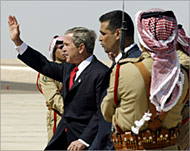Hopes high for Aqaba summit
US President George W Bush arrived at the Jordanian Red Sea resort of Aqaba on Wednesday for talks with Palestinian and Israeli leaders aimed at securing their commitment for a US-backed “road map”.
 |
| This is Bush’s first high profile role in the Palestinian-Israeli conflict |
Bush is meeting Palestinian Prime Minister Mahmoud Abbas and his Israeli counterpart Ariel Sharon in an effort to shore up their support for the US blueprint aimed at ending the Palestinian-Israeli conflict.
Officials from both sides said they were preparing to formally sign on to the plan, and exchanged expressions of good faith despite the remaining obstacles. But the two sides failed to agree on a final joint text.
The Aqaba meeting follows talks between Bush and Arab leaders at the Egyptian Red Sea resort of Sharm el-Sheikh on Tuesday.
Leaders from Egypt, Saudi Arabia, Bahrain and Jordan supported the “road map”, buoying expectations for the Aqaba summit.
Abbas is expected to reiterate pledges to crackdown on Palestinian resistance attacks against Israel’s occupation, while stopping short of announcing a ceasefire as stipulated in the plan.
Abbas said on Tuesday he was confident that Hamas and Islamic Jihad, who are spearheading the intifada or uprising against Israel’s occupation, would end military operations.
Hamas confirmed it would end resistance attacks if it had guarantees of an Israeli withdrawal from occupied Palestinian territories.
When asked if Hamas would halt operations, senior Hamas official Ismail Abu Shanab said, “Definitely yes…We are ready to offer it at any time if there is a guarantee that those preliminary steps will be taken as part of a full or wide-scale withdrawal, and not the final steps.”
He was speaking on ABC’s “Nightline” programme.
Abu Shanab told Aljazeera the plan was only a “virtual idea with nothing on the ground”.
The Hamas official said the group did not oppose positive steps to move forward in peace making, but insisted that they be implemented.
He reiterated Palestinians would be willing to halt resistance activities once Israel ended its violence against civilians.
Israel’s reservations
 |
|
Israel registered 14 reservations |
While the Palestinians and other Arabs have fully endorsed the plan, Israel offered its grudging approval after expressing 14 reservations.
And on the day it conditionally endorsed the blueprint, Israel passed a resolution refusing the right of return for Palestinian refugees.
The right of return for Palestinian refugees, the fate of occupied East Jerusalem, and Jewish settlements continue to be issues of contention between the two sides. The US-supported “road map” does not address them.
Israel is also balking at returning land it occupied in the 1967 Arab-Israeli war, including the West Bank, Gaza Strip and East Jerusalem.
East Jerusalem is home to Al-Aqsa mosque, Islam’s third holiest site.
Israel has said it will dismantle what it deems are “rogue” Jewish settlements, built only over the last two years in some areas. Under international law, all settlements are illegal.
Despite Israel’s claims it wants to move forward with peace, Israeli troops on Wednesday blew up the homes of three Palestinian activists in the occupied West Bank town of Yatta.
The houses provided shelter for a total of 31 people, including women and children.
Israeli tanks launched a raid into the occupied West Bank city of Jenin, storming homes and detaining residents. It re-imposed a crippling blockade, days after Israel said it was lifting curfews.
Abbas’ debut
 |
|
Washington sidelined Arafat in |
The two summits mark the emergence of Abbas as the main talking partner for Israel and the United States, which had insisted on sidelining Palestinian President Yasser Arafat.
Israel and Washington say Arafat failed to curb resistance activities, a task they expect Abbas to carry out.
Arafat was not invited to Tuesday’s meeting in Egypt. He told the Israeli newspaper Maariv he hoped the Aqaba summit would lead to peace.
Abbas’ performance is being watched closely and he hopes to strengthen his weak power base. Some Palestinian observers say he has gained a grace period from the Palestinian people.
“He is under pressure to deliver more than just a piece of paper or risk losing his credibility,” said Ali Jarbawi, a political scientist at Bir Zeit University in the occupied West Bank.